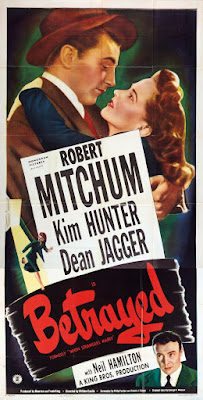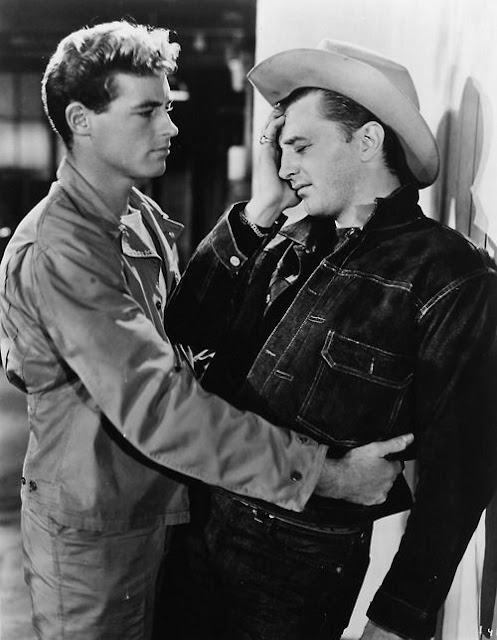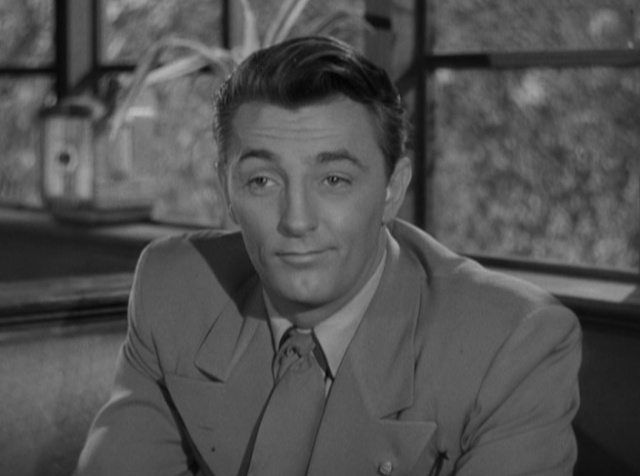In 1949, Robert Mitchum was a household name. By that time he had made a splash in the genre that was later dubbed film noir with movies such as The Locket (1946), Undercurrent (1946), Crossfire (1947) and the noir we all know and love Out of the Past (1947). That last film made him famous and his arrest in 1948 for the possession of marijuana made him notorious. The King brothers, Frank and Maurice King, must have been following the trajectory of Mitchum's career very closely. Five years earlier, Mitchum made two films for the King brothers and poverty row studio Monogram Pictures. The first one was Johnny Doesn't Live Here Anymore (1944) (you can read my review here), a WWII housing shortage comedy starring Simone Simon. Mitchum had a very minor role in that film. He got a juicier part in When Strangers Marry (1944) which also produced by the King brothers and distributed by Monogram. In that film Mitchum didn't have the lead role but he was third billed with his name truncated to Bob Mitchum so it would fit the poster. Fast forward five years and Mitchum was now making movies for Howard Hughes at RKO. And he was doing well. If you know anything about the King brothers you'd know that when they saw a money-making opportunity they pounced. With Mitchum's fame and notoriety firmly established in Hollywood, Maurice and Frank King re-released their two Mitchum movies. They bumped up his name to top billing, altered the posters to more prominently display the star and changed Johnny Doesn't Live Here Anymore to And So They Were Married and When Strangers Marry to the more ominous Betrayed.
 |
| When Strangers Marry (1944) poster. Compare with the Betrayed poster and how Mitchum's name is positioned. |
Betrayed (1944), aka When Strangers Marry, is a film noir directed by William Castle and based on a story by George Moskov. The movie starts with the murder of wealthy drunk Charlie (Milton Kibee). He was last seen with traveling salesman Paul Baxter (Dean Jagger) who helped Charlie to his home. The police discover Charlie had been strangled with a pair of silk stockings. Baxter recently wed Mildred (Kim Hunter). The two have barely known each other, meeting only three times before they married and haven't seen each other since the wedding. Mildred can't find her husband and enlists the help of her former beau Fred Graham (Robert Mitchum) and the police. Everyone begins to suspect Paul Baxter has been up to something. He doesn't want to be seen in public and has been acting very shady. Police begin to investigate with some help from Fred. Does Mildred really know the man she married? The story takes twists and turns in the way a good mystery should.
 |
| Kim Hunter and Dean Jagger in Betrayed (1944) |
This was a new-to-me noir and I quite enjoyed it. The movie can be melodramatic at times especially when things heat up towards the end. But overall its an enjoyable 67 minute poverty row noir. Dean Jagger effectively plays the paranoid salesman on the run. Kim Hunter is charming as Mildred and I like that her character grows from befuddled to more independently minded. Milton Kibbee adds a bit of dark humor at the beginning of the film. Neil Hamilton, a familiar face in the 1930s and 1940s, plays Lieutenant Blake. Rhonda Fleming has a bit part in the last scene of the movie which effectively closes the loop on the entire plot.
 |
| Mitchum and a dog. Enough said? |
Then there is Robert Mitchum. I might be biased considering the fact that he's my favorite actor but Mitchum is an absolute charmer in this movie. There were a few glorious moments for swooning. He's shirtless in the Turkish bath scene. Mitchum is at the peak of his handsomeness and the camera lingers long enough on his beautiful face for viewers to take in some of his gorgeous features. And he's often seen with an adorable Boston Terrier. My husband said "Robert Mitchum chillin' with a dog, that's all you need in your life." Too true. Too true. There's one important scene at the height of the film's drama that Mitchum may have overacted. He was still relatively knew to acting and this was before subtlety became his strong suit.
Betrayed (1944) is a good noir with a fine cast, decent tension and a fun plot twist. TCM will be showing it as When Strangers Marry (1944) on Robert Mitchum day August 6th during Summer Under the Stars. That day also happens to be the 100th anniversary of Mitchum's birth.
Betrayed (1944) is available from the Warner Archive Instant Streaming. This movie is also available on DVD-MOD from Warner Archive's shop. You can buy the DVD-R by using this link. Shopping through my buy links and banners helps support this site. Thank you!
Warner Archive Wednesday - On (random) Wednesdays, I review one title from the Warner Archive Collection. Thank you to the Warner Archive Instant for the opportunity to review this film!





























.jpg)


























